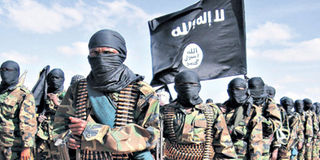Dersso: Why terrorism is a symptom of the problem Africa faces

Al-Shabaab fighters.
The threat of deadly terrorism in Africa has grown from strength to strength, with the frequency of attacks rising exponentially.
By the counts of African Union’s Algiers-based African Centre on the study of terrorism, Africa witnessed a 400 percent rise in attacks, fueling a 237 percent rise in deaths between 2012 and 2020. And civilians are bearing the brunt of much of these violent attacks by the perpetrators, but also sometimes from counterterrorism operations.
According to the Centre’s 2022 Mid-Year Africa Terrorism Trends Analysis, 433 out of the 699 terrorist attacks perpetrated during the first half of 2022 were launched against civilians. Out of the 5,412 deaths that were recorded during the period, 3,517 were civilian deaths.
Geographically, the threat has expanded across all regions of the continent. Ghana’s President Nana Akufo-Addo warned in a meeting last November that the “worsening situation …threatens to engulf the entire West Africa.” He was demonstrating the continuing expansion of terrorism in the continent including emerging signs of terrorist activities in littoral states of West Africa.
In May last year, Amani Africa, the pan-African think-tank based in Addis Ababa published a report that said “Africa faces the unfortunate challenge of having become the epicentre of terrorism and violent extremism.” The research report was released ahead of the African Union Summit at the time. Africa accounts for about 50 percent of global deaths due to terrorism. And four of the ten countries globally to have experienced increase in deaths from terrorism in 2021 are also in Africa. They are Burkina Faso, Democratic Republic of Congo (DRC), Mali and Niger.
Amani Africa’s report pointed out that the threat of terrorism is growing despite the investment in and increased use of counterterrorism measures. Mousa Faki Mahamat, the AU Commission Chairperson noted in his address to the AU summit in Malabo in May that from Somalia to the Sahel and Mozambique. The continental body and affiliated regional blocs have deployed various military operations.
So far, an analysis of African Union’s decisions shows that some nine hard security instruments have been initiated to deal with terrorism hotspots across the continent, between 2010 and 2022. This is without counting the various security initiatives of multilateral and bilateral partners. Yet the threat of terrorism has continued to grow in spite of these investments.
One explanation Mr Mahamat highlighted last week is the lack of adequate support to make the use of these hard security instruments effective. Similarly, during his visit to West Africa, UN Secretary-General Antonio Gutierres said that the “operating in circumstances … call not for a peacekeeping force, but a strong force to enforce peace and fight terrorism.”
Elaborating further, the UNSG said the force would need to be ‘from the African Union, but with a Chapter Seven Security Council mandate and obligatory financing.’
Amani Africa’s report did find capacity gaps that limit the effectiveness of the hard security instruments used for countering terrorism on the continent. It calls to debate whether hard security measures should be the lead response tool against terrorism in Africa. The study found that the dominant view about terrorism in Africa is based on a misdiagnosis of the nature of the phenomenon. Yet each of the challenges should be assessed and appropriate policy responses taken.
Across Africa, there are two aspects to the misdiagnosis, according to our findings. The first is that it considers groups identified as terrorists to be the core of the problem. Second, it also erroneously states that these groups are mainly ideologically driven by global jihad. In fact, we learnt that terrorist groups are the symptom of the main problem.
Additionally, they are complex socio-political entities embedded in and feed on local political, social and security dynamics. We found that “the political and socio-economic governance pathologies” and the grievances and vulnerabilities that these produce on the part of affected communities are the major conditions that precipitate the emergence and growth of terrorist groups. Experiences from the Sahel to Mozambique provide rich data to illustrate this.
Such misdiagnosis also led to faulty policy responses. Rather than focusing on approaches that address “the political and socio-economic pathologies,” the responses so far have focused on eliminating the symptom of the problem. They become both state security oriented and hard security based, hence too mechanical bereft of the fundamental political, social, cultural and economic tools the context demands.
Kenya’s Permanent Secretary for Foreign Affairs Dr Korir Sing’oei echoed this on December 15 when observed, at the UN Security Council, that “[t]oo much counterterrorism is too kinetic and narrowly technical.”
Our study recommends a shift in both the diagnosis of and the policy response measures to the threat of terrorism. We advocate for a human security-based approach that brings to the centre of policy analysis and intervention affected communities and the resolution of their grievances and the conflict dynamics of which terrorist groups are a part.
This shift in policy approaches demands that the same, if not more, level of infusion of technical assistance, financial resources and training of civilian expertise is directed to the governance, the economic and social issues facing communities in affected territories.
In terms of early warning and risk assessment, it demands a focus on human-security-oriented approaches, which unlike security and military intelligence-based early warning and risk assessment, expands the gaze of analysis beyond state security issues and recognises and puts premium on the underlying human security issues which require governance reform, development and humanitarian intervention responses.
This proposal does not dispense with the role of hard security instruments. It rather emphasises the primacy of political strategy and the political and socio-economic governance issues that make the emergence and expansion of terrorism possible.
The author is the founding Executive Director, Amani Africa, Addis Ababa-based pan-African think tank.





